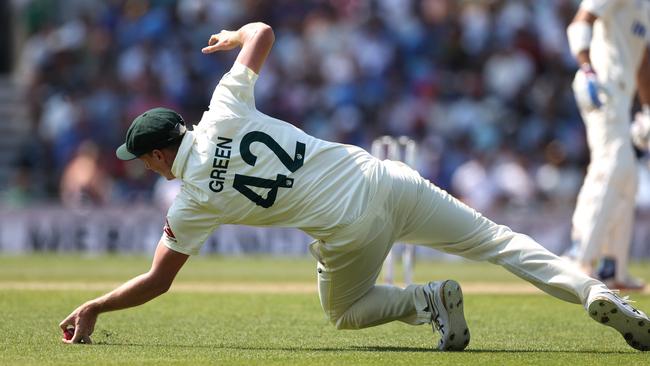Cricket must urgently simplify one of its muddiest laws to save players the unjust humiliation of being labelled cheats
The taunting of Cameron Green by the crowd at The Oval was a disgrace. And if cricket doesn’t urgently simplify one of its laws, more players will be unjustly labelled cheats.

Cricket needs to urgently simplify one of its muddiest laws to save players like Cameron Green the unjust humiliation of being labelled a cheat.
The International Cricket Council thought it had solved world peace earlier this year when it announced it was removing the on-field umpire’s ‘soft signal’ from being a factor in adjudicating on contentious low catches.
But the controversy that’s swallowed up Green overnight in the World Test Championship Final – through no fault of his own – shows the ICC didn’t go far enough, and the real problem is in the ambiguous wording of cricket’s law book.
Law 33 states that as long as complete control has been maintained in the taking of a catch, it’s OK for the ball to lick a bit of grass after that point.
But what is complete control?
This is the specific passage that needs to be clarified to protect innocent players like Green becoming inadvertent victims like what happened at The Oval, where the 24-year-old was set upon by large sections of the crowd chanting “cheat”.
Is complete control when you have your hand over the ball, as Green did six inches above the ground?

Or is it when your hand stops moving? Which Green’s hadn’t by the time it came into contact with the grass.
Natural fairness says if you take the ball in your hand, it should have the right to touch grass if you’ve got it in control.
But the point the ICC needs to get to the crux of is, what is complete control?
Because as it stands everyone is confused.
Video umpire Richard Kettleborough gave Shubman Gill out to Green’s spectacular diving catch at gully, satisfied that the big fella had his supersized digits under the ball, and with complete control.
In Kettleborough’s eyes, control was what mattered, the grass was irrelevant.
That’s fine, but Kettleborough is also the same umpire who gave three batsmen not out in this year’s Sydney Test to contentious low catches.
In the video age, words in the rule book are not enough.
Show us images. Show us videos of what is a fair catch, and what is not a fair catch.
Let’s have some examples pinned up as precedents.
Of course the most surefire way to make this grey area black and white would be to change the wording to say no grass can touch the ball in a catch. Period.
If you can’t get your whole hand under the ball to catch it, then it’s not out.
But in a world where batsmen already get everything, it seems wrong to effectively wipe out an entire genre of catches which are often the most spectacular to watch.
Green’s catch – although contentious – was athletically brilliant and it would seem a shame if catching effectively became something you can only do six inches above the ground.

Removing the soft signal from umpires on the ground was the correct move because they were always only guessing.
But even though the video umpire is more informed with replays and angles, these catches are still very subjective.
It was one of those calls in sport where most fans of the team on the right side of the decision agree, and most on the wrong side are up in arms.
How would Australia have felt if Steve Smith was given out from a catch like that when Australia was fighting for survival in the Test Final?
SEN commentator Bharat Sundaresan as an Indian, now living in Australia and covering the Australian team – and a qualified umpire – was probably coming from the most neutral perspective of anybody… and he had Green’s catch as legitimate and Gill out.
One thing is for sure, the taunting of Green by the crowd was a disgrace. He can’t have known 100 per cent whether it was out, and nor is it is his job to know.
How will this impact Green next year when he suits up again in the Indian Premier League with Rohit Sharma as his captain?
The ICC need to go further than they have already and clear up the confusion in the rule book.







To join the conversation, please log in. Don't have an account? Register
Join the conversation, you are commenting as Logout